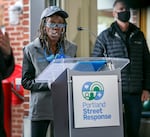The city of Portland and the U.S. Department of Justice were back in federal court Wednesday to update U.S. District Court Judge Michael Simon on the city’s ongoing non-compliance with the 2014 settlement agreement.
The agreement came about after the Justice Department sued Portland over what it alleged was a habit of unconstitutional use of force by police against people with mental illness. The rules outlined in the legally binding agreement are meant to address several key areas involving training, oversight and the use of force.
The city came into full compliance for the first time in February 2020, but years of progress quickly unraveled when that summer’s protests revealed significant gaps in the police bureau’s adherence to its own directives.

A 2019 file photo of a liaison officer with the Portland Police Bureau.
Bradley W. Parks / OPB
Recent revelations that the use of force against people in mental health crises has become more frequent and more severe suggest the city’s regression is the product of more fundamental problems at the bureau and not a result of the extraordinary circumstances of 2020, as city attorneys have argued. A team meant to advise the police bureau’s behavioral health unit said last year it could not discuss actual encounters between officers and people in crisis. The advisory team also said it cannot review police shootings and other violent encounters.
“I’ve lost faith in the city attorneys. I’ve lost faith in the DOJ really holding the police accountable and I’ve lost faith in the COCL,” said Portland Commissioner Jo Ann Hardesty, referring to the compliance officer and community liaison charged with independently assessing the police bureau’s compliance with the settlement agreement.
For years before being elected to public office, Hardesty was involved in the settlement agreement as a civil rights activist.
“I did not wanna speak with the city today, because I don’t see myself standing with people saying, ‘We’re doing a good job,’” she told Simon. “We’re not.”
Hardesty pleaded with the judge to not let the city off the hook and to see past the city’s “good words” by demanding tangible actions.
Wednesday’s hearing was scheduled so Portland could update the court on several unresolved issues from an April hearing when Simon approved amendments to the agreement that were meant to bring the city back into compliance. Among the issues the judge wanted to hear more about were:
- body camera policies,
- an investigation into an offensive meme included in a training slide,
- progress on hiring a civilian to oversee police training,
- and Portland Street Response, a program with first responders specially trained to help people in mental health crises without involving police.
The city reported that negotiations with the police union on body camera policies are ongoing and that more sessions are scheduled through September. The city recently extended a job offer to a soon-to-be-retired Los Angeles police sergeant to come on as the civilian dean overseeing the Portland Police Bureau’s training division. After problems surfaced in his background check, that offer was rescinded. City attorneys told Simon they had learned from the failed process and are restarting their search.
Hardesty said offering the job to a police officer from Los Angeles was evidence the city is not serious about improving the bureau’s training.
“And the exhibit is us hiring someone from the most racist police department in the country, who not only had 20 years of experience as a Los Angeles police department person, but the last 10 as their No. 2 training person,” she said in court. “I asked you, judge, have you ever heard one positive report come out of the Los Angeles police department? Because I, personally, have not.”
Simon agreed and said he’d seen several disturbing cases involving the LAPD come before the Ninth Circuit Court of Appeals.
All parties agreed Portland Street Response was so far a success, but Hardesty expressed concerns the young agency was being isolated from the patrol officers it routinely works with.

Commissioner Jo Ann Hardesty in a file photo from a 2021 press conference regarding Portland Street Response.
Kristyna Wentz-Graff / OPB
In its assessment, the Justice Department found that between Jan. 10, 2021 and March 31 of this year the city had fallen out of compliance with 30 paragraphs of the 187-paragraph settlement agreement, a significant increase from the 11 paragraphs it was out of compliance on last summer.
But in a court filing last week, Portland city attorneys gently pushed back against the narrative laid out by federal prosecutors that Portland had backslid over the past year. Rather than responding directly to DOJ criticism, however, city attorneys instead highlighted what they argue are the city’s many successes.
Among the highlights, the city said it had hired an outside firm to complete a critical assessment of the 2020 protest response and that the Independent Police Review, the agency responsible for police oversight, had recently initiated internal investigations into supervisors that year.
City attorneys also highlighted progress, however slow, in launching a body-worn camera pilot program.
Those triumphs, however, were poorly received by the Albina Ministerial Alliance and the Mental Health Alliance, two organizations named by the court as interested parties.
The outside firm Portland hired for its critical assessment was brought on only after the police bureau’s own internal audit was labeled deficient by the Department of Justice. The Justice Deparment said Portland police officials designed the audit to validate the police bureau’s response to the protests, rather than to critically assess the force that was used.
“PPB has held itself out as a learning organization,” Albina Ministerial Alliance attorney Ashlee Albies told the court. “But in order to be a learning organization, it must self-reflect and do so critically. And it’s not for the purposes of punishment. It is for the purpose of … holding officers accountable, holding systems accountable, so that the public has faith in that system.”
It remains to be seen if the Independent Police Review will have success investigating Portland Police Bureau leadership, given the Justice Department’s critique that the oversight body is waiting on tens of thousands of police bureau documents needed for its investigations.
The Department of Justice assessment excoriated the city and its police bureau over offensive training material that surfaced in September and that was included in a 2018 Rapid Response Team training.
“The materials contain varying degrees of offensive content, incorrect guidance, and false or misleading information related to PPB’s crowd management policies and practices,” Justice Department attorneys wrote. And the training material was provided to the department in a way that “continues a concerning pattern of untimely and incomplete production of information in this case.”
Failing to follow use-of-force guidelines
In its assessment, the Justice Department said the city “continues to face significant compliance challenges related to reporting force, investigating force reports, and evaluating whether force and force investigations comply with policy.”
In short, the police bureau is still failing to follow its own use-of-force guidelines, a problem first brought to the Justice Department’s attention in 2020, when police failed to properly document and investigate thousands of use of force incidents against protestors. Among other examples, the city was cited for failing to investigate policy violations during police shootings including a requirement that officers attempt to de-escalate prior to using force.
Other issues cited in the Justice Department assessment are new and suggest that the city has not fully grappled with shortcomings raised by the federal agency or by community groups involved in the settlement agreement.
In one incident, for example, Officer Craig Lehman shot and injured Joshua Lyle Merritt in a Northwest Portland deli last July, then Lehman’s partner Douglas Dickinson fired a Taser. Despite Portland Police Bureau directives requiring Dickinson to be interviewed on-scene, Dickinson refused an interview and was excused by the city, over the objections of the Independent Police Review director.
‘Find and bite’ instead of ‘find and bark’
The Justice Department also found issues with the bureau’s K9 training.
“Two separate canine force events show that PPB has a find-and-bite practice. The preferred professional standard is find-and-bark,” the DOJ said. “A find-and-bite practice fails to ensure force ‘is no greater than necessary to accomplish a lawful objective.’”
And while federal prosecutors said the city had adhered to force reporting requirements in several instances, Justice Department attorneys pointed to other times when officers and police bureau leaders did not follow bureau policy and even repeated the same reporting failures that had dragged the city out of compliance in 2020.
Risking ‘grievous injuries’
For example, an officer threw a pellet grenade into a group of protesters at Lents Park the day Officer Zachary Long shot and killed Robert Delgado.That ran contrary to bureau training and risked “grievous injuries.” Pellet grenades, or what the police bureau calls a “rubber ball distraction device,” detonate and disperse small pellets for 50 feet in every direction.
“This indiscriminate use of force does not evidence compliance with the force provisions of this Agreement or PPB’s force policies,” the assessment said.
The Justice Department has asked if the Portland Police Bureau will decommission all pellet grenades, given that state law prohibits indiscriminate use of force, but the federal agency said the police bureau has not taken that step.
These shortcomings in training, leadership, and accountability are taking a toll on officers, according to the Department of Justice assessment. During a 2021 wellness exercise, officers complained of being ostracized in their places of worship and kids’ schools and the assessment said “officers called out PPB’s managers for not ‘owning poor training, policy, and direction.’”
‘We want policing to work’
Still, despite the many shortcomings, Justice Department lawyers said they saw “considerable cause for optimism going forward.” They said the city had come back into compliance with several sections and continues to revamp how it handles crisis response.
“We want policing to work,” Judge Simon said in his closing comments Wednesday. “We want our community to trust our police officers. We want our police officers to continue to feel good about what they do and to earn the respect of the people that they serve.”
And with greater respect and more confidence in the police, Simon said, their jobs will become easier and the public more cooperative in helping reduce crime.
